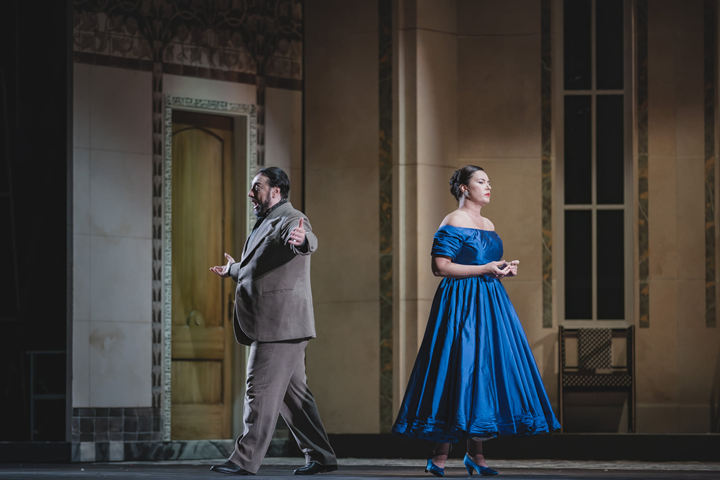| Opera Reviews | 25 April 2024 |
Sonya Yoncheva shines in Giordano's Siberiaby Silvia Luraghi |
|
Giordano: Siberia |
|

|
|
|
Siberia is the most talked about among lesser known operas by Giordano, but it also remains one of the least performed. Post-war revivals are virtually limited to a number of festival performances, including Wexford (1999) and Martina Franca (2003), and some isolated concert performances, with a peak of two performances in 2015, one by New York City’s Teatro Grattacielo and the other at Milan’s Conservatory. In spite of being often mentioned as the composer’s favorite opera, Siberia did not generate enthusiasm, either from the public or from the critics, from the very beginning of its life. It premiered in Milan in 1903, and was shown in theaters around the world for about a decade. When Giordano presented a revised version again at La Scala in 1927, it had already disappeared from programming, unlike his Andrea Chenier or Fedora which had premiered a few years earlier. The reason for this mainly lies in the limited theatrical qualities of Luigi Illica’s libretto, and certainly not in the music, which stands the comparison with the composer’s more popular titles. The plot echoes themes from 19th century Russian literature, including Tolstoy’s Resurrection and Dostoyevsky’s The house of the dead, which both were sources of inspiration for other composers as well. In the first act, Stephana, a courtesan who had been sold by her former lover Gleby to Prince Alexis Frouwor, has fallen in love with Vassili, a soldier. Unexpectedly, Vassili comes to Alexis' home to see his aunt Nikona, who is a servant there, and meets Stephana. As he kills Alexis in a duel, he is deported to the trans-Baykal mines. The second act opens with the column of prisoners going to the deportation camp. Stephana joins Vassili and the two vow eternal love to each other. In the third act, the prisoners celebrate Easter when Gleby, who has also been deported, approaches Stephana and tries to convincer her to run away with him. After a long confrontation between Gleby, the camp’s Governor and Vassili, the latter finally tries to escape with Stephana, who is mortally wounded and dies in the arms of her beloved. The imbalance in the length of the three acts is one of the problems of the libretto, with the third act equaling the length of the first two. The solution found in Florence to have a (very long!) interval after the second act did not help. Given the fact that the total duration of the music is about an hour and 45 minutes, it would have been much better not to have intervals at all, also because the settings, mainly projected, did not require major changes. I found the music very interesting and especially liked the second act, with the chorus inspired by Russian musical themes. The score calls for important voices, with huge volume and a solid high register. Soprano Sonya Yoncheva was well cast in the demanding role of Stephana, the real protagonist of the opera, and portrayed the heroine as appropriately passionate and impulsive. At her side, tenor Giorgi Sturua was a more restrained yet compelling Vassili, while baritone George Petean was an adequately vulgar and at moments even menacing Gleby. However the greatest merit goes to Maestro Gianandrea Noseda, whose original project was a season premier at Turin’s Teatro Regio scheduled in 2018, but cancelled for political reasons (the new city mayor fired the company’s general manager). Noseda conducted with great care and attention to each instrument and to the singers, and was able to bring to the surface the value of this score which was unknown to the most of the audience. The performance I saw was successful, in spite of the many empty seats - not a direct consequence of Covid-19 restrictions, but partly due to the scarcity of tourists visiting Florence this year.
|
|
| Text ©
Silvia Luraghi Photo © Maggio Musicale Fiorentino |
|







